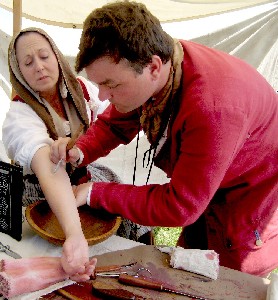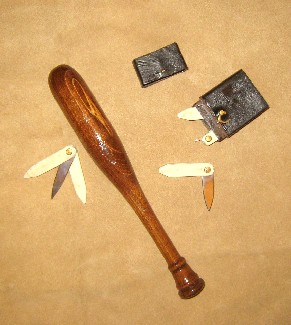
Bloodletting Procedure Page Menu: 1 2 3 4 Next>>
Bloodletting Procedure During the Golden Age of Piracy, Page 1
"Bleeding is the most common Chirurgical Operation, and seems the easiest, but yet is liable to the most
Accidents; some of which may justly be ascribed to the Chirurgeon, of which sort are the pricking of a Nerve,
Tendon, or Artery; but an infinite Number of them are followed by fatal Consequences, which, tho' the
Patients themselves have occasion'd them, they yet expect the Chirurgeons to be responsible for them. He who
bleeds [Patients] most, is most expos'd to these Misfortunes, because that having acquired the Reputation of
Bleeding well, the most difficult Cases fall to his Lot. In the Opinion of all Chirurgeons Bleeding is the most
dangerous Operation in their Art, and that which gives them the greatest Mortification: They desire to rid their
Hands of it as soon as they possibly can, and when they come into good Practise in Paris, they are very
glad to quit Bleeding, firmly believing they have drawn a great Thorn out of their Foot." '
(A Course of Chirurgical Operations, Demonstrated in the Royal Garden at Paris, 2nd Edition, by
Monsieur Dionis, p. 377)

Photo: Mary Diamond
Mission bleeding Lisa Dousharm
Bleeding is one of the most recommended operations in the sea surgery manuals. It is often mentioned out of hand
without any explanation on how it is to be done. This may be due to the fact that it "seems the easiest" as
M. Dionis says or that it was so well known to the contemporary surgical manual readers that it didn't bear
repeating. Thus I was delighted to discover M. Dionis's classroom-like surgeon's procedurial manual that explains the
operation of bloodletting (also referred to as bleeding, venasection, airing/breathing/opening a vein and phlebotomy in the various sea
surgeon's manuals) as well as all the issues that attend it. M. Dionis first published his work in 1710. It must have
been a useful manual for the second edition was published after his death in 1733. The translation of the book into
English is one of the more readable ones for the current audiences. I have inserted some paragraph breaks and a few
explanations in square brackets, but it is quite readable even without those small modifications. Dionis also has a
lovely dry wit that you will occasionally sense, making his writings all the better, especially for this web page.
I liken bleeding to the prescribing of drugs today. When someone was ill or wounded, bleeding was often prescribed as a way to balance the humors by removing the bad ones so that the body would have room to produced good ones. Its roots go all the way back to Hippocrates (460 BC – 370 BC), although it was probably Galen (129 – 217 AD) whose writings made it the widely practised procedure it had become by the Golden Age of Piracy (1685 - 1710). Even though bloodletting and the humoral theory on which it was predicated had little practical benefit to the patient in most cases, it continued to be used up through the mid/late 1800s. When the true cause of diseases began to be understood, surgeons began to realize that bloodletting was not helping the patients (and, in some cases, over-bleeding was killing them) and the practise finally ceased. All of this was far in the future during the Golden Age, however. So, without further ado, I present Monsieur Dionis' very thorough description of the recommended procedure for bloodletting.
Dionis' Argument for Bleeding
""The greatest Remedy in the Medicinal Arts is, incontestably, Bleeding; it cannot be sufficiently prais 'd, by reason of all its excellent Effects which so loudly declare in its Favour, that it must be allowed, that nothing hitherto invented has exceeded Bleeding. Let's then leave it to those whose Talent is Eloquence to address its Panegyric, and content our selves with shewing our Dexterity in performing this Operation, which on some Arms is the most difficult in Chirurgery.
What I advance will surprise those who believe nothing so easy as Bleeding; and indeed I agree with them, that
'tis the most facile Operation when we find large Veins to be opened; but they must, in Conjunction with all
those who are experienced in the Art of Bleeding, allow that in some Arms the Veins are so small that 'tis
impossible to feel them, and very dangerous to hazard the opening of them. In the Opinion of all Chirurgeons, there
are no Operations, how great and difficult soever they may appear, which they would not rather choose to run thro

Mission's lancets/fleams with case and bleeding stick.
The stick is for driving the lancet into the skin.
' than some Bleedings, in which, after a tedious Search, and due regard had to all necessary Precautions, the
Vein slips from and escapes the Point of the Lancet." (Dionis, p. 358)
"…we scarce know any thing which don't require this Operation [bleeding]. What confirms me in this Opinion, is, that I find most Physicians prescribe it to all their Patients, which they would not do if they did not judge it necessary to their Cure: But it not being the Chirurgeon's Business to discourse of those Distempers which are subjected to the Medicinal Art [On land, this is the responsibility of the Physicians. However, since there were rarely physicians at sea, it was indeed the responsibility of the surgeon (or Chirurgeon)] let us keep within the Bounds prescribed us, and only treat of the Bleedings proper for those diseases which fall under the Cognizance of Chirurgery." (Dionis, p. 359)
"'Tis agreed, that Bleeding and Purgation [making people vomit on purpose in this case] are the Remedies which take place of all others; the one evacuates the Blood, and the other the Humours, which may prove pernicious to Man: But as we always remain Masters of Bleeding, and can stop it whenever the Patient cannot bear, or faints under it, and the Course of the Purge once swallowed cannot be interrupted whatsoever Mischief it may occasion, we may with Justice give preference to Bleeding, which claims the first Rank, and whose Excellence cannot be too highly praised considering the good Effects which we daily find to result from it.
Those who are naturally carping Critics, and would find Spots in the Sun, cannot help allowing, that of all Remedies this is the best, but yet they pretend to condemn the too frequent Use of it, urging that 'tis a Mistake to bleed in all sorts of Distempers, and that to bleed a Patient eighteen or twenty times for one Disease, is to cut his Throat.
To the first Part of the Proposition we answer, that the first Cause of all Distempers being in the Blood, by reason that 'tis composed of a Mixture of an infinite Number of Liquors [liquids] which incessantly circulate thro' the whole Body, and are very subject to Corruption, as well as from the exotic Leaven which they retain of the Aliments, as because of the want of Respiration, or the Exercise of some other natural Function, we cannot otherwise reduce them, than by having Recourse to the Source, and evacuating the Blood, and those Liquids which occasion the Disease we desire to cure.
The Answer to the second Proposition is, that we are to bleed more or less, according to the Nature of the Indisposition, and the Strength of the Patient. For, if without regard to these two Circumstances, we should equally bleed all Patients, 'twould be to abuse this Remedy by using it without due Knowledge of a Reason why; but there is no limited Number set for any Disease, or any Patient. This Distemper suffers it self to be tam'd by two Venæsections, that will obstinately resist a dozen: and if that Operation is sometimes performed eighteen or twenty times, 'tis on such sanguine Persons whose Constitution renders such a Quantity necessary to subject the Indisposition, and which are not so weak after that great Number of Bleedings, as others would be after three or four." (Dionis, p. 361-2)

